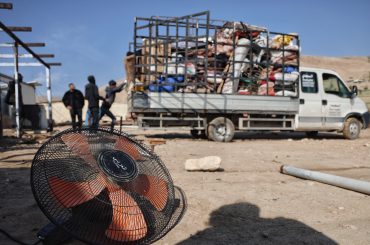During Tuesday night’s “Jewish perspectives on the BDS campaign” debate in New York, the audience had the opportunity to make comments or ask questions. Esther Kaplan, the moderator of the debate and co-host of WBAI’s Beyond the Pale, called on me, and I had a question for the opponents of BDS.
Throughout the discussion, J.J. Goldberg, the columnist for the Forward, and Kathleen Peratis, a J Street board member, emphasized the need for solutions that would “work” to end the occupation. Goldberg made reference to the “peace process” and the 2003 Geneva Accord, seemingly saying that the way to settle the conflict was through dialogue and negotiations.
My question went something like this: The so-called “peace process” that you reference roughly started in 1991, with the Madrid Conference, and we’re now in the year 2010. That’s about 20 years. It appears that the “peace process” has failed and that negotiations have led to nowhere, and that was due to the Israeli refusal to accept a viable two-state solution. I said that both Hamas and the Palestinian Authority are willing to accept a Palestinian state in only 22% of historic Palestine. Israel, it seems, wants it all.
So, if negotiations have failed, why do you oppose BDS as a tool to end the occupation? BDS is, in fact, slowly working; it hasn’t had a huge impact economically, but that’s not the whole point, as Hannah Mermelstein, a panelist in favor of BDS, pointed out. Mermelstein said that an important part of BDS was that it was an educational tool as well, and that it’s opening up the discourse on Israel/Palestine. The Israeli government is deeply worried about this growing movement, as evidenced by the hysterical reports coming out of the Reut Institute and the latest draconian bill in the Knesset that would criminalize BDS.
Goldberg responded to me by saying something like this (I don’t remember it word for word): The peace process really only went on for less than a decade, during the Oslo years. The negotiations didn’t fail because of the Israelis; no, it was the Second Intifada and the suicide bombings directed at Israeli civilians that killed the peace process. The intifada put the nail in the coffin of the Israeli Left, and now the Israeli public believes that there is no one to negotiate with.
I didn’t get a chance to respond directly, but if I did, I would have said something like this: Mr. Goldberg, it seems that you are omitting some very crucial facts about the Oslo years. During the 1990s, Israel relentlessly continued to colonize the West Bank and Gaza. The occupation, and all of its mechanisms of oppression, didn’t end; Israel just outsourced the responsibilities it wanted to throw off its shoulders to the Palestinian Authority, which, under the boot of Israel, was never a fully functioning government. The Oslo years were more about “normalizing” the occupation rather than ending it.
Yes, the Second Intifada was bloody, but let’s not forget that the Second Intifada began as a nonviolent popular uprising. It only turned violent after Israel brutally suppressed the uprising, firing 1.3 million bullets into the West Bank and Gaza Strip after Israeli security forces were directed to "fan the flames", as Haaretz’s Akiva Eldar reported in 2004.
As John Dugard wrote in a 2008 U.N. report, the violence perpetrated against Israelis during the Second Intifada “must be understood as being a painful but inevitable consequence of colonialism, apartheid or occupation. History is replete with examples of military occupation that have been resisted by violence – acts of terror.”
I think the boat that Goldberg is on has sailed, and that the two-state solution is dead. Soon, Zionism and the idea of an ethnically exclusivist state that denies the rights of its indigenous inhabitants will run out of gas. The BDS movement is being fueled by the fire of history, and will end with justice for Palestinians.

